Vekselberg — Tatarstan 4.0: Renova to start 'digital revolution' with artificial intelligence installation
About how the president of Skolkovo has become ''friends'' with the authorities of Tatarstan; and why it is beneficial for both sides
On 4 April, Tatarstan President Rustam Minnikhanov visited Naberezhnye Chelny to hold a seminar in IT Park with the participation of representatives of the subsidiary company of Renova Group — Tsifra PLC. Tsifra began to create the infrastructure of Industry 4.0 with Kazan Helicopters and Tatneft, 56% of oil of which is produced using the models of digital twins of oil and gas fields. However, only a third of Tatarstan companies are engaged in digitalization. The correspondent of Realnoe Vremya attended the seminar and tried to figure out when and why Vekselberg became ''friends'' with the authorities of Tatarstan, heard that Renova claim that their main objective is not the promotion of their products, but the creation of a new market.
Vekselberg's Tsifra has entered Tatarstan to make a 'digital revolution'…
On 4 April, ''Production Digitalization: Practical Solutions'' seminar took place in IT Park in Naberezhnye Chelny with participation of Tatarstan President Rustam Minnikhanov, Head of Renova-Holding Rus Oleg Fomichev and President of Skolkovo Foundation Viktor Vekselberg, before which the representatives of ''Renova's digital subsidiary'', Tsifra PLC showed the top managers of the companies and officials the layout of ''Digital shop model with implemented monitoring system''.
Opening the seminar, Rustam Minnikhanov noted that Tatarstan is already cooperating with the leading digitalization centres of Russia. Along with this, Tatarstan and its enterprises are also implementing their own projects on digital technology development, such as the project of unmanned vehicle of KAMAZ PJSC is being implemented, for which the company had to introduce digital technologies by itself; Pozis with the participation of Rostec opened an updated industrial complex (labour productivity is expected to eventually increase by 22%); Tatneft produces more than half of oil (56%) using the models of digital twins of oil and gas fields.
''Besides, within the framework of cooperation with Renova, the project of equipment monitoring is being implemented,'' Minnikhanov said.
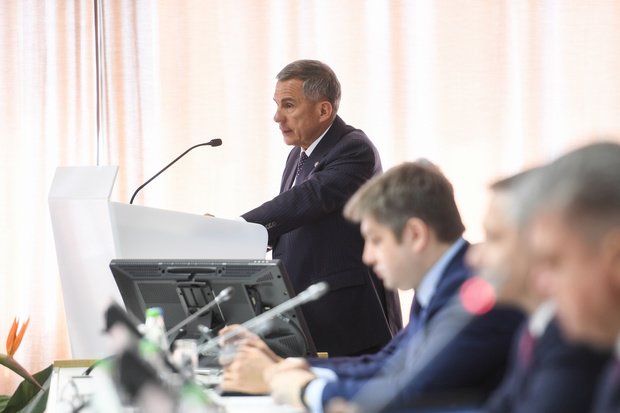
Started with Tatneft PJSC and increased its oil production
Interestingly, Tatneft cooperates with Renova not directly, but right through Tsifra PLC, about which it became known last August at a meeting of the board of directors of Tatneftekhiminvest-holding JSC. About the fact that the solutions of Tsifra PLC allow to the increase the oil production it was told by Deputy Director of the company Yury Krylov. For this purpose, IIOT and AI for industry were developed (digital plant, digital field and digital power plant).
According to him, the tools of the digital plant allow to provide full coverage of all business processes of production management, the accounting and management of all material and energy flows of the enterprise. But in 2018, Tsifra had already been successfully working in oil production as well — as told by Director General of Tatneft PJSC Nail Maganov to Rustam Minnikhanov: ''We cooperate and will continue to cooperate.'' The representatives of Tsifra told in response that they were ''groping'' for ways to use developments in the petrochemical industry and oil refining of the republic.
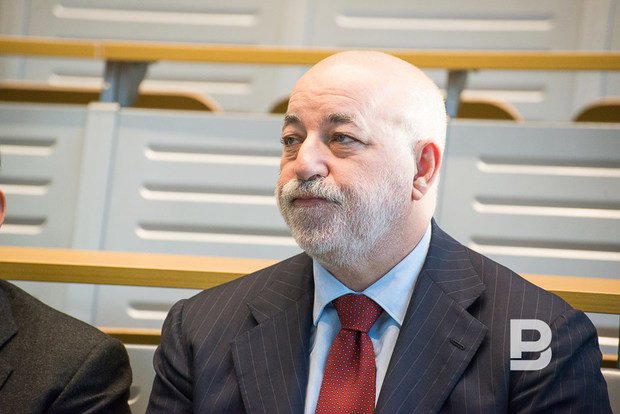
What kind of Tsifra is it and why Viktor Vekselberg needs AI?
Viktor Vekselberg, who stood at the origins of Skolkovo Foundation, claims the laurels of ''the digital king of Russia'' with his Tsifra. For the first time about Tsifra they mentioned in September 2017, when Vekselberg's Renova Group announced the creation of the company to ''provide digital transformation technologies to customers from capital-intensive industries''. It was planned that Tsifra was to become one of the leaders of the industrial Internet market in Russia and would enter the international arena, choosing the markets of Europe and Asia as launching platforms.
The company intended to create its own products, develop existing solutions of the group and invest in advanced technologies of industrial Internet and artificial intelligence. Vekselberg planned to invest more than 6 billion rubles in the new project and proudly said that he decided to make the company the leader of the artificial intelligence market, listing the priority projects of Tsifra: energy, medicine, banking (later other industries became key ones, see below).
By the end of 2019, it was planned to spend 850 million rubles on creating own products and investing in others: in particular, the IIOT system for industrial equipment monitoring Dispatcher (developed by Stankoservis Innovation Centre PLC in Smolensk — Tsifra concluded an investment deal with it at 850 million rubles), which was discussed at the meeting of Tatneftekhiminvest-holding and which, as the representatives of Tsifra told on 4 April, had already been installed at Kazan Helicopters.
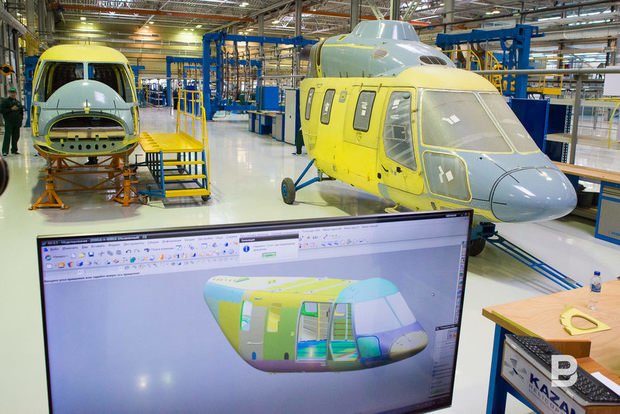
Tsifra has already invested 3 billion rubles, acquiring a number of startups and starting cooperation with Rostec
Already in March 2019 it became known that the young company of Vekselberg managed to invest 3 billion rubles in IT for the industry, that is already half of the declared investments — for its own developments and for the purchase of third-party companies in the field of artificial intelligence and the industrial Internet of things.
By this time, Tsifra had acquired the monitoring system of industrial equipment Foreman (St. Petersburg), then the startup in the field of industrial artificial intelligence Theta Data Solutions and, finally, concluded a deal to acquire a majority ownership stake in Vist Group at 2 billion rubles. The company's products are sold in the markets of Finland, China, Bulgaria, Romania, Singapore, Morocco, India, said Head of Tsifra Igor Bogachev, among the Russian customers he named United Engine Corporation, part of Rostec, Gazprom Neft, Khimprom, Novocherkassk Electric Locomotive Plant, MMZ Vpered, RubEx, Aviastar-SP. Tsifra, initially 100% owned by Renova-Holding Rus, today 60% owned by Viktor Vekselberg personally — Renova-Holding Rus, the director for strategic planning and development of which was sitting next to the president of the Republic of Tatarstan, owns 25% left.
About how Vekselberg has become ''friends'' with the authorities of Tatarstan and why it is beneficial to both sides
Tsifra officially entered Tatarstan in October last year, when a working meeting was held in the ministry of industry and trade of the Republic of Tatarstan with representatives of Renova: Oleg Fomichev and Director of Tsifra Igor Bogachev met with Minister Albert Karimov then.
The meeting focused on ''the digital economy in the framework of complex projects of digital transformation of industry — from industrial process management to industrial analytics'', in other words: the authorities of Tatarstan and Vekselberg's Renova negotiated on major investment projects on digitalization of Tatarstan companies.
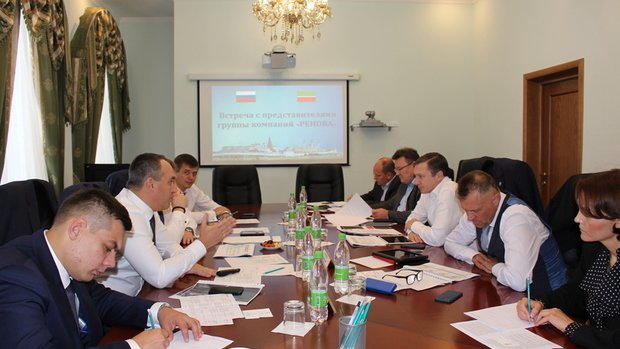
Thus, one side — Tatarstan — is going to solve the issue of digitalization of the republican economy in pursuance of Putin's May Decree (according to which the growth of labour productivity should reach 5% by 2024), and the other side — Tsifra — is going to receive commercial benefits from this. The fact that the enterprises of the city do not need the servicesof Tsifra (and why) was argued and told about at the seminar by the representatives of Tsifra's clients, who use the system Dispatcher (IC Stankoservis IC and Teploobmennik SC PDC), with so ''clever'' reports that only engineers or experienced programmers could understand the details.
It is unknown how much the creation of the complex monitoring system with CNC AIS Dispatcher will cost exactly, but on the procurement website of Tula Oblast there is information about such lot worth 4,2 million rubles (data for the summer of 2017). Obviously, the amount will be more impressive as the larger the enterprise will be.
Renova assures that their main objective is not the promotion of their products, but creation of a new market
Oleg Fomichev, the director for strategic planning and development at Renova-Holding Rus PLC, openly admitted in his welcoming speech that without the cooperation of the companies part of Renova holding with the ministry of industry of Albert Karimov it would be difficult for Tsifra.
''Tatarstan is one of the 11 pilot regions of the Russian Federation where the labour productivity project is being implemented. In the meantime, the average labour productivity in Russian economy is two times lower than in Europe. And one of the key areas to eliminate this backlog is production digitalization. This is one of the most effective ways to increase productivity, which directly affects revenue, profits, opportunities to invest,'' he explained.
In 2017, in the structure of our group there appeared the company Tsifra, which is rapidly increasing its turnover, including by combining its efforts with leading Russian companies in the field of industrial Internet and artificial intelligence. The key industries for the company today are engineering, oil and gas sector, chemical industry.
According to him, Vekselberg's structures agreed with the authorities of the Republic of Tatarstan to hold the seminar already in October last year (at the same meeting with Albert Karimov, apparently). But he assured that the task of Renova is not so much to promote the products of Tsifra, as to form the market of companies of processing sectors for digital transformation, the same market of artificial intelligence. Although he agreed that Tsifra would try to win competition in the created market from other companies.
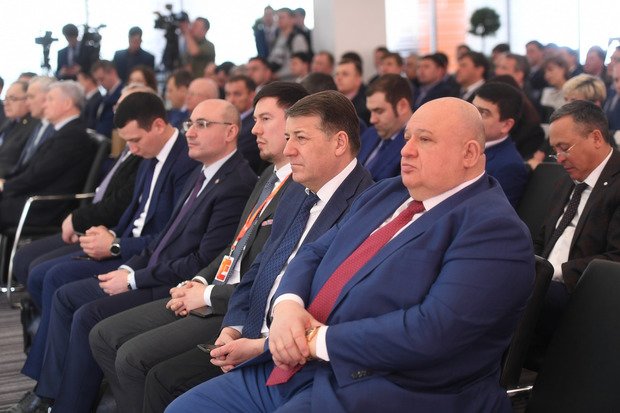
Tsifra: technologies are ripe, but there is no ''shelf product'' yet, but it is still necessary to engage in digitalization
Director for Development at Tsifra PLC Alexander Smolensky, speaking about the digitalization of industry and Industry 4.0, assured Rustam Minnikhanov that the situation with digitalization in Tatarstan is better than, for example, in Germany, where two out of ten companies at most are engaged in it.
''According to my calculations, the total effect of digitalization programmes in Russia has already reached about 200-250 billion rubles. But experts estimate this market in general at tens of billions of dollars,'' he told. ''That is, the effect is already there, but the digitalization of the industry is late! In retail and banking the processes are faster.''
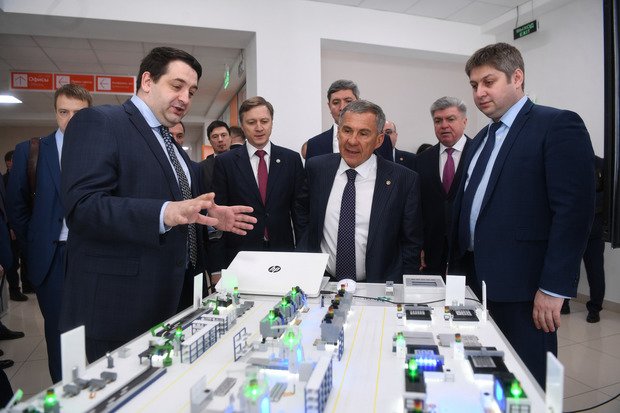
The optimization of technological processes, optimization of equipment give an increase in labour productivity only in the second place — changes in the technological process. This always requires a lot of effort and investment, he agreed (and the return in the form of direct financial benefits is not immediately noticeable, Smolensky implied, apparently).